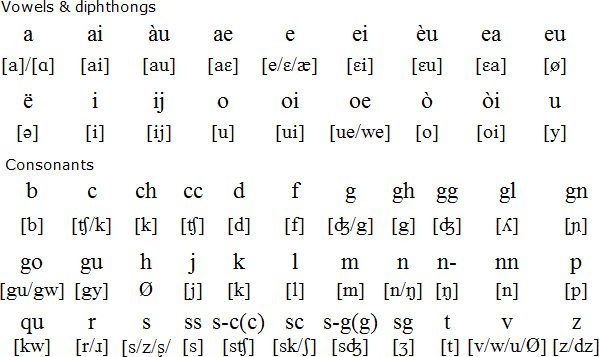Piedmontese language, alphabet and pronunciation (original) (raw)
Piedmontese (piemontèis)
Piedmontese is a Romance language spoken by about 3 million people throughout the Piedmont (Piemont) region of northwest Italy. To the east of this region varieties of Western Lombard are spoken, and in the high western valleys Piedmontese is spoken alongside varieties of Provençal. It is also spoken in Argentina, Brazil, California, Australia and Chile.
Piedmontese has never been an official language but in the last thirty years it has been recognized as a separate language by the Council of Europe, the Piemonte region, UNESCO, some linguists and most Italians. It is not currently taught in schools but some people are trying to have it introduced into primary schools. Piedmontese is spoken mainly by older people and is not popular with the young, particularly in the cities and towns. As a result, it is in danger of becoming extinct within a couple of generations.
The first texts written in Piedmontese appeared during the 12th century, before any Italian literary works were published. They were the Sermones Subalpini, a collection of twenty religious pieces written in an archaic form of the language which is now difficult to understand. Literature in Piedmontese started to appear during the 17th century. and the first grammar of Piedmontese was published in the 18th century. The period from 1850-1960 was the gold age for Piedmontese theater and song and there is currently a lively Piedmontese poetry scene. The most famous living Piedmontese singer is Gipo Farassino.
| A a | B b | C c | D d | E e | Ë ë | F f | G g |
|---|---|---|---|---|---|---|---|
| a | be | ce | de | é/è | ë | ef/fe | ge |
| H h | I i | J j | L l | M m | N n | Ò ò | O o |
| aca | i | je | el | em | enn | ò | o |
| P p | Q q | R r | S s | T t | U u | V v | Z z |
| pe | co | er | ess | te | u | ve | zita/zed |
Piedmontese pronunciation

Notes
- c = [ʧ] before i or e/but [k] elsewhere
- g = [ʤ] before i or e/but [g] elsewhere
- s = [z] between vowels/after consonants and at the ends of words
- At the ends of words d = [t]/v = [w/f]/n = [ŋ] and lengthens the preceding vowel
- sci-/sce-/gl-/sgi-/sge- are found in some archaic words
Sample text in Piedmontese
Tùit j'esse uman a nasso lìber e uguaj an dignità e an drit. A son dotà ‘d sust e ‘d consiensa e a dëvo agì j’un con j’àutri ant n’ëspìrit ëd fradlansa.
(Artìcol 1 dla Diciarassion Universala dij Drit ëd l'Òm)
Translation
All human beings are born free and equal in dignity and rights. They are endowed with reason and conscience and should act towards one another in a spirit of brotherhood.
(Article 1 of the Universal Declaration of Human Rights)
Information provided by G. Garella (articioc@libero.it), with corrections and additions by the Gioventura Piemontèisa
Sample videos in Piedmontese
Information about Piedmontese | Numbers
Links
Information about Piedmontese
http://en.wikipedia.org/wiki/Piedmontese_language
Piedmontese language and culture organisations
http://www.gioventurapiemonteisa.net
http://www.piemont.org
http://www.piemont482.org
http://www.studipiemontesi.it
http://piemonteis.xoom.it
http://www.piemunteis.it
Sit an Piemontèis (in Piedmontese, Italian and English)
http://xoomer.virgilio.it/guidematt/
Songs, videos and recordings in Piedmontese
http://www.youtube.com/playlist?list=PL74E572EBF941642C
http://www2.hu-berlin.de/Vivaldi/index.php?id=mP348&lang=it
Romance languages
Aragonese, Aranese,Aromanian, Asturian, Catalan,Corsican,Dalmatian,Emilian-Romagnol, Extremaduran,Fala,Franco-Provençal,French, Friulian, Galician, Gallo, Gascon,Genoese,Guernésiais, Istro-Romanian,Istriot,Italian,Jèrriais,Ladino,Ladin,Ligurian,Lombard,Lorrain,Megleno-Romanian, Mirandese,Moldovan,Monégasque,Mozarabic,Neapolitan, Occitan,Occitan (Auvergnat),Occitan (Languedocien),Occitan (Limousin),Occitan (Provençal),Picard,Piedmontese,Portuguese,Romanian, Romansh, Sardinian,Sicilian, Spanish,Valencian,Venetian, Walloon
Languages written with the Latin alphabet
Page last modified: 28.06.21
[top]
You can support this site by Buying Me A Coffee, and if you like what you see on this page, you can use the buttons below to share it with people you know.
If you like this site and find it useful, you can support it by making a donation via PayPal or Patreon, or by contributing in other ways. Omniglot is how I make my living.
Note: all links on this site to Amazon.com


[top]


